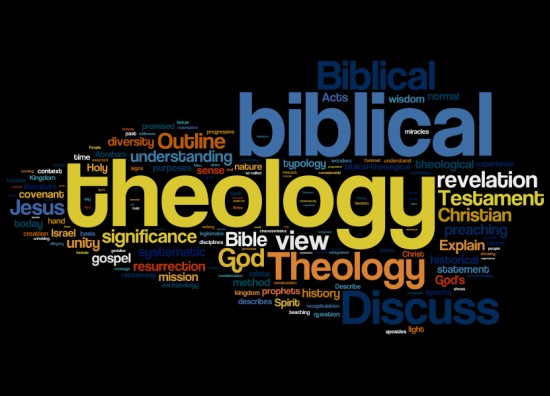I get a lot of Bible and theology questions sent in to me from the “Ask a Bible and Theology Question” section in the sidebar. Though I am not always able to respond by email to all that I get, I do try to respond to most.
I decided that as part of my response to these Bible and Theology questions, I would post my answers on this blog. I will probably do this once a week or so, and put some (but not all) of the answers I provided so that you can weigh in on them as well.

Question: If all life – human, animal, plant, angel – is in Christ, why didn’t all life come to an end when Christ died on the cross?
First, I am not sure it is correct to say that everything was in Christ. Being “in” Christ is a special New Testament concept for people who have believed in Jesus for eternal life. It refers to being spiritually identified with Christ in His death, burial, and resurrection.
I do think that Jesus died, buried, and rose again to redeem all things, but that is slightly different than being “in” Christ.
Furthermore, even for those of us who were “in” Christ, it is a spiritual identification, so that when He died, was buried, and rose again, we also died, were buried, and rose again with Him — spiritually. Romans 6 talks some about this.
It’s kind of like being “in” a country as a citizen. If we are citizens of that country, we are identified with it. But if that country ceases to exist, we continue to live, but our identity changes. Did you ever see the movie “The Terminal” with Tom Hanks? His county disbanded, but he continued to live.
That’s a really bad analogy, but it helps get at the point. Also, I am not trying to say that Jesus ceased to exist when He died…
My answer is getting off track pretty quick…
The bottom line is this: Being “in”Christ is a special theological concept in the New Testament which takes some study to comprehend. It means that we are identified with Christ in His life, death, burial, and resurrection, and as such, receive certain spiritual blessings and benefits as a result.
Oh, and one more thing. You asked why all life didn’t come to an end when Jesus died. Interestingly, it could be argued that it was through the death of Jesus that all life truly began.
Question: I turned my back on God and fear I cannot be fully-restored. How can I find out if it is possible or not? I was a Spirit filled born-again believer and I turned my back on God and entered into some very terrible sins. I keep living this lifestyle and fear my salvation is at risk. Even though I read scriptures on confessing, etc.. I do not feel any better.
Please help me.
There is a lot about your situation I do not know, but let me try to answer what I can from the little you have told me.
First, if you have believed in Jesus for eternal life, you are already fully restored. As a child in God’s family, you are loved, forgiven, accepted, and reconciled to God. You have been regenerated, indwelled, baptized, and sealed by the Holy Spirit.
However, your sins may have caused some broken fellowship between you and God. Think of your relationship with God like any other human relationship. If you are born into a family, you are a child of your parents and brother to your siblings no matter what. These bonds cannot be erased or undone. However, even though you are part of the family, you may not have contact with your parents or with your siblings for years on end. This means that you are out of fellowship with them. You are still in the family, but fellowship is broken. To restore that fellowship, you would have to maybe confess some sin to them, humble yourself and return to them, or simply get on the phone and call them up.
It is the same with God. If you have believed in Jesus for eternal life, you are in the family. Nothing can break that bond. However, sin can break fellowship with God and with other believers. This is why confession and repentance are important.
 So some of the issues you are facing may simply be some misunderstanding about the nature of your relationship with God. Once you understand that He loves and forgives you completely, and that you are in His family forever, this liberates you to love Him in return and not be worried about sin making God angry at you (He was never angry at you in the first place).
So some of the issues you are facing may simply be some misunderstanding about the nature of your relationship with God. Once you understand that He loves and forgives you completely, and that you are in His family forever, this liberates you to love Him in return and not be worried about sin making God angry at you (He was never angry at you in the first place).
Remember that when Jesus died for your sins, all of them were future to Him, and He died anyway. Not one of your sins surprised Him or made Him wish He had not died for you. He loves you infinitely, forgives you completely, and wants to be restored into fellowship with you.
As for not feeling better, this is one of the negative consequences of sin. Sin does not take us out of God’s grace or forgiveness, but it does damage us emotionally, psychologically, physically, mentally, and even spiritually. But you will not be able to break the habit of sin on your own. You need to first realize how much God loves you–even in the midst of your sin. Until you understand the love of God, no victory over sin and temptation will be possible.
So focus on God’s infinite love for you. Over time, you will begin to see that sin no longer has the temptation that it once did.
I have written about some of this in my book, Why You Have Not Committed the Unforgivable Sin. Feel free to get it from Amazon.com.
Question: When the so-called Reformation happened all it did was reform the same old religion and not the church. There is no such thing as popes, priests, and pastors. If you think about it they’re all the same thing.
I agree with you. The Reformation did little to change much about the “Christian religion.” I think it did help to remove some of the abuses of religion, but it introduced a whole host of others.
I am glad, however, that Martin Luther helped remind the church that eternal life is by grace alone through faith alone in Christ alone.
Anyway, regarding pastors and priests, I have written several posts on the topic of pastors, and will be putting out a book about this in the next year or two… To get it for free, make sure you have subscribed to the email newsletter.




Your answer to the second question is very kind and filled with grace.
The question on the Reformation reminded me what our mutual friend said about the Renaissance. The Renaissance exists primarily in the imaginations of those who came after. The times preceding were not at all “dark”. Quite the opposite. In similar fashion, the Reformation was most probably not all that it has been made out to be. As if Luther and Protestantism eliminated the excesses and abuses of the “church” prior to that time. Nyet.
Human nature being what it is, will it not take far more to truly change the church? – It will and we don’t want to know what the “more” will be.
Thanks, Sam. I try to answer these questions with grace. It is sometimes difficult (I’m human too!).
I often wish I could have lived back during the Renaissance… though I know that for most people, it was not the Golden Age we make it out to be…
I agree Sam, my family are going through terrible abuse by manipulation in the church at present but now irs been exposed and its not us who is the problem we can fight the battles with head held high.
The churches have a long way to go as every one of them Judge us in the church and those outside. Might is not right. Grace always is. Clive X
I’m just reminded by the articles and responses here, that these problems and difficulties are the reason we have the Epistles in the NT. The first churches were not without any of these problems, and they had the Apostles, sub-Apostles and more present with them. Being born of God does not change our old-nature, He gives us a new one. Unfortunately there are many who do not seek His Kingdom and His Righteousness – they seek their own righteousness even by faith. I’ve been helped by Jeremy and all who respond in the blog here. I’m grateful we are together seeking to stretch out from the boundaries we perceive which are man-made artifices. Let us please recall though, that Tradition means what we do – and that most folks do not reform back to the Biblical faith they just start a new Tradition.
At least that has been my experience with congregations and groups of Christians gathering in His Name; from home church to high-church in the Anglican Communion churches, wet or dry sides of giftedness, Young Life, et al. We know, do we not, that any who by faith in God through our Savior is a member of the Body. That means we are children of the Father, and we are family. Let me confess that even in my family relations there are troubles – since we still pack our old-natures with us. Come Lord Jesus, bringing our salvation and redemption with You. Maranatha! Peace in Him to you, out!
Excellent points, Gregory. Sometimes people want to go back to the “Golden age” of the church when the apostles were alive and leading the church, but when we study the New Testament, those decades were anything but golden.
The “in Christ” concept was the topic of my doctoral thesis. It is almost exclusively a Pauline term (of the 76 locations in the NT, 73 are in 11 of Paul’s epistles). There are at least two parallel expressions, viz. “in the Lord” and “in Him”. Paul’s usage of these terms can be classified as follows:
Something humanity receives or has received through Christ as mediator – 34; the oneness of God and Christ (the love of God is represented in the life and death of Christ) and what the believer gains out of this oneness – 8; identification as the church or body of believers – 47; and the believer as a transformed person – 63.
With all of this said, Jeremy, you summed it up well in your first paragraph. As a concise answer to give anyone, that would be “it”.
Thank you for the kind comment, Gerrie, especially since you wrote your Thesis on the subject. I appreciate it.